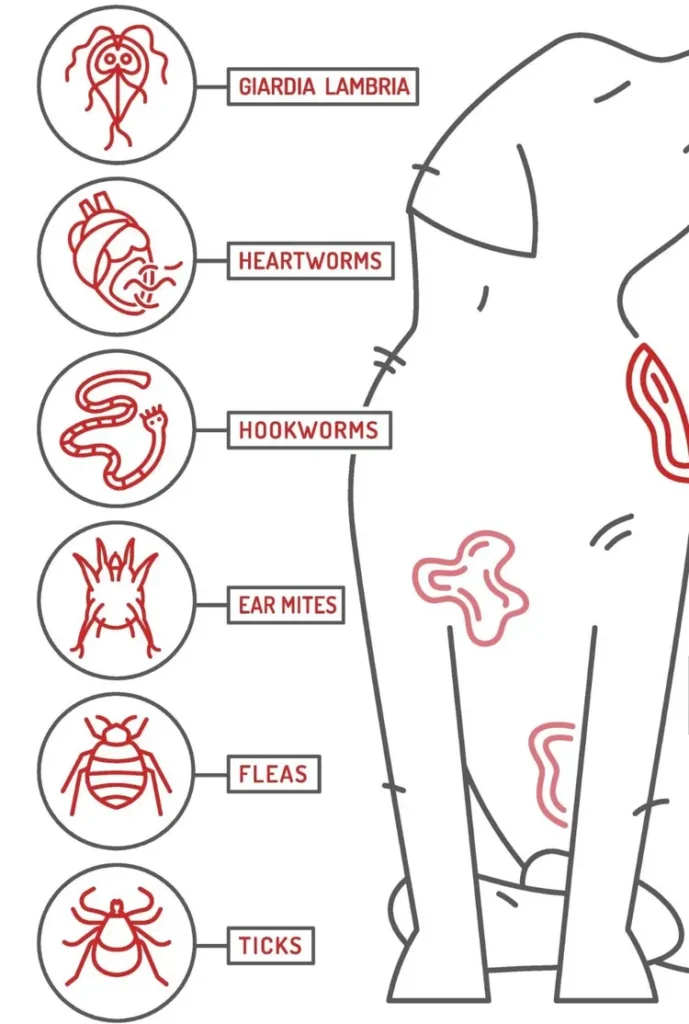Is your dog scratching more than usual or acting out of character? While these behaviors may seem like quirks, they could indicate a parasitic infection. Parasites, both internal and external, can pose serious health risks for dogs if left untreated. Early detection is crucial for maintaining your pup’s health and happiness. This article will help you identify the signs of parasitic infections and explore eco-friendly prevention tips and treatment options.
Common Types of Parasites in Dogs
Parasitic infections in dogs can be categorized into internal parasites and external parasites. Understanding the different types of parasites will help you know what signs to look for and how to act if you suspect an infection.
Internal Parasites
- Roundworms: These are among the most common internal parasites in dogs, especially in puppies. They live in the intestines and consume the dog’s partially digested food, causing malnutrition and digestive issues.
- Tapeworms: Tapeworms attach to the intestinal lining and steal nutrients from their host. Dogs often get tapeworms by ingesting infected fleas.
- Hookworms: These parasites feed on the blood of dogs, leading to anemia and other serious health issues. They can be contracted through contaminated soil or by ingesting larvae.
- Heartworms: Spread through mosquito bites, heartworms live in the dog’s heart and can cause significant cardiovascular damage if untreated. This parasite can be life-threatening.
- Whipworms: These parasites live in the large intestine and feed on the blood of the host. They can cause chronic diarrhea, weight loss, and general lethargy.
External Parasites
- Fleas: Fleas are one of the most common external parasites. They bite and feed on a dog’s blood, causing itching, irritation, and even allergies. Fleas can also carry tapeworm larvae, leading to internal infections.
- Ticks: Ticks are another common pest that feeds on blood and can transmit dangerous diseases like Lyme disease and Rocky Mountain spotted fever.
- Mites: These microscopic parasites can cause mange, a condition characterized by severe itching, hair loss, and scabbing.
- Lice: Dog lice are smaller pests that live on the skin and fur, causing intense itching, irritation, and, in severe cases, anemia.
Signs Your Dog Might Have Parasites
Knowing how to identify the early warning signs of parasites is essential for prompt treatment. Here are some key symptoms to watch for in both internal and external infections.

Digestive Issues
- Diarrhea: Persistent diarrhea can be a sign of intestinal parasites like roundworms, hookworms, or whipworms.
- Vomiting: Dogs infected with internal parasites may vomit more frequently.
- Weight Loss: If your dog is losing weight despite eating normally, it could indicate parasites are absorbing nutrients meant for your dog.
- Bloated Abdomen: Puppies with roundworms often have a pot-bellied appearance due to the parasites causing inflammation and discomfort in the intestines.
Changes in Behavior
- Restlessness: Dogs with parasites might feel uncomfortable or irritated, leading to excessive movement, pacing, or an inability to relax.
- Fatigue: If your dog is showing signs of lethargy, it could be due to blood loss (in the case of hookworms or fleas) or general weakness caused by poor nutrient absorption.
Skin Irritations
- Scratching and Biting: External parasites such as fleas, ticks, and mites can cause intense itching, leading your dog to scratch or bite at the affected areas frequently.
- Hair Loss: Patchy hair loss or thinning fur is a common symptom of mites or flea infestations.
- Redness and Swelling: Ticks and fleas can cause redness, swelling, or inflamed bite marks on your dog’s skin.
Visual Evidence
- Worms in Stool: One of the most obvious signs of intestinal parasites is visible worms in your dog’s feces. Roundworms appear as long, spaghetti-like strands, while tapeworm segments look like small grains of rice.
- White Specks Around the Anus: Tapeworm segments may also be visible around your dog’s anus or on bedding.
Coughing or Breathing Problems
- Heartworm infections often result in persistent coughing, especially after physical activity. If left untreated, heartworm can lead to severe breathing difficulties.

Eco-Friendly Prevention Tips
Parasites can wreak havoc on your dog’s health, but there are eco-conscious ways to prevent and manage these infections. Here are some sustainable practices for keeping your dog parasite-free while minimizing environmental impact.
Regular Grooming
- Regular grooming helps reduce the likelihood of flea and tick infestations. Use biodegradable brushes and combs, and make sure to bathe your dog with natural, non-toxic shampoos that are free from harmful chemicals like parabens or sulfates.
Natural Flea and Tick Repellents
- Instead of chemical treatments, opt for natural alternatives like neem oil, citrus-based sprays, or essential oil blends (e.g., lavender, peppermint, or cedarwood). Be cautious with essential oils and consult a vet to ensure safe use.
Keep the Environment Clean
- Fleas and ticks can survive in your dog’s bedding or carpets, so make sure to wash these items frequently with eco-friendly detergents. Regular vacuuming will also help eliminate fleas and eggs from your home.
Diet for Immune Support
- Feeding your dog a high-quality, sustainable diet strengthens their immune system, making them less vulnerable to infections. Look for dog food made from organic ingredients and free from unnecessary fillers. Supplement their diet with immune-boosting foods like carrots, sweet potatoes, or omega-3-rich fish oils.
When to Seek Veterinary Care
While eco-friendly prevention methods can be effective, it’s essential to consult a veterinarian if you suspect your dog has parasites. Early intervention can prevent serious health complications.
Routine Testing
- Your vet may recommend fecal exams at least once a year to check for internal parasites like roundworms, hookworms, or whipworms. Regular testing is crucial, especially if your dog frequents parks or other areas with high exposure to other dogs.
Medication
- If your dog tests positive for parasites, your vet may prescribe deworming medications. Some treatments may be more eco-conscious than others, so talk to your vet about options that align with your values. Flea and tick preventatives like oral medications or topical treatments are often necessary, but opt for products that use fewer chemicals and have less environmental impact when possible.
Heartworm Prevention
- Preventing heartworms is critical, especially in areas where mosquitoes are prevalent. Annual testing is recommended, and monthly heartworm preventatives are often necessary. Look for brands that are committed to sustainability and have a lower environmental footprint.
Being proactive is key to keeping your dog free from parasites. By learning to recognize the signs of infection and implementing eco-friendly prevention strategies, you can safeguard your dog’s health and well-being without harming the environment. Whether it’s through regular grooming, natural repellents, or eco-conscious treatments, these small changes can make a big difference.



